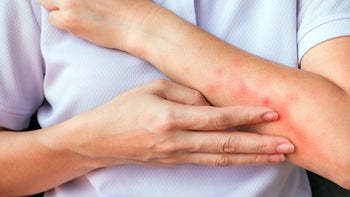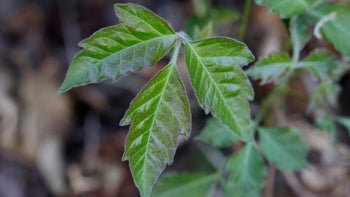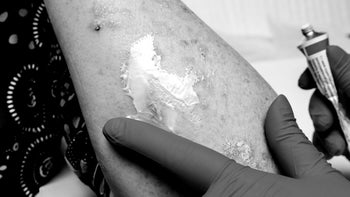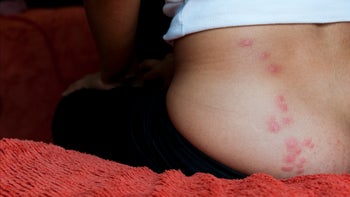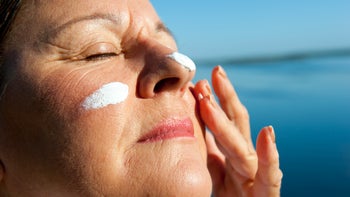
Why Mosquito Bites Itch, and How to Stop It
Key takeaways:
Mosquito bites itch because mosquito saliva triggers your immune system to release histamine — and histamine makes you itch.
You can stop mosquito bites from itching by using ice packs, steroid creams, anti-histamines, or oatmeal baths.
Scratching mosquito bites can lead to skin infections, so try to avoid scratching them.
Table of contents

Most people are familiar with the annoying reality of mosquito bites. Sometimes, no matter how careful you are, you end up with multiple, itchy bites.
While you can’t completely avoid mosquitoes, there’s still plenty you can do to relieve itchy mosquito bites. Let’s take a look at why mosquito bites itch — and what you can do to stop mosquito bites from itching.
Why do mosquito bites itch?
Mosquito bites itch because of a chemical called histamine. A mosquito injects saliva into your body when it bites you. This triggers your immune system to release histamine, and a side effect of this substance is itchy skin.
Search and compare options
Histamine is a signal to the rest of the immune system that there’s something in the body that shouldn’t be there. It makes the immune system work on getting rid of the mosquito saliva. But itching isn’t the only symptom. Histamine can also cause other symptoms of a mosquito bite, including:
Redness
Swelling
Pain
How long should a mosquito bite itch?
Mosquito bite itching usually starts about 20 minutes after a bite and gets worse over the next 24 to 36 hours. The itching will gradually disappear over 7 to 10 days.
Can you have an allergic reaction to a mosquito bite?
Yes, you can have an allergic reaction to a mosquito bite. When the body releases histamine, most people have mild symptoms of itchy, red, swollen bumps. But if you have an allergy to the mosquito’s saliva, you may have a stronger reaction. Skeeter syndrome is a more severe, localized, allergic reaction to mosquito bites. It causes large, itchy, painful, red areas of swelling. It can also cause fevers. This can take several weeks to resolve.
In rare cases, some people develop a severe allergic reaction called anaphylaxis, which affects the whole body. Symptoms usually start within minutes of a bite and can include vomiting, trouble breathing, or fast heartbeat. Anaphylaxis is a medical emergency. If you suspect it, seek immediate medical care, since it can be life-threatening.
How can you get mosquito bites to stop itching?
There are several things you can try at home to relieve itching from a mosquito bite:
Ice packs: Ice can help decrease swelling and itchiness. Apply an ice pack to your bite for about 10 minutes. You can reapply whenever the itching gets worse. Make sure to wrap the ice pack (or ice) in a towel. Applying ice directly to your skin can lead to skin damage.
Anti-itch pastes: Try some DIY anti-itch pastes. Mix 1 tbsp of baking soda with enough water to create a paste. Or mix oatmeal bath products with water to form a paste. Apply your paste of choice to your bite for 10 minutes and then wash it off. You can reapply the paste for worsening itchiness as you need it.
Steroid cream: You can try anti-itch cream for mosquito bites to help relieve itching. Over-the-counter (OTC) 1% hydrocortisone cream is a great option. Make sure you stop using it after a few days to avoid side effects like skin discoloration.
Antihistamines: You can also use non-sedating OTC antihistamine medications to relieve mosquito bite itching. Common options include loratadine (Claritin) or cetirizine (Zyrtec). Just make sure to follow directions for dosing.
Numbing cream: Numbing creams — like topical lidocaine — can be used for temporary relief of pain, itching, and burning from bug bites. This is usually available OTC.
Oatmeal baths: If you’ve got bites all over your body, oatmeal baths can be a helpful way to treat the itching. To make an oatmeal bath, either grind oatmeal into a fine powder, or buy colloidal oatmeal. Then add it to your bath and soak in it for 10 to 15 minutes.
Toothpaste: This might seem like a strange option. But many toothpastes contain menthol, an ingredient that triggers a cooling sensation. Menthol can help treat pain and itching caused by mosquito bites.
Stop scratching: This tip is easier said than done. But when you scratch your skin, it triggers something called the itch-scratch cycle. The more you scratch the skin, the itchier it’ll feel. So try your hardest to avoid scratching.
Natural mosquito repellant: The best way to avoid mosquito bite itching is to prevent getting bit in the first place. Here are some natural options for mosquito repellant.
Are you a mosquito magnet? Some people seem to get more bites than others. Learn about factors — like body odor and temperature — that can make a difference.
Bedbugs vs. mosquito bites: Unsure if those bites are from mosquitos? Check out our quick visual guide to tell apart bed bug versus mosquito bites.
Other skin bumps that can be mistaken for a mosquito bite
Mosquito bites aren’t the only cause of itchy skin bumps. It can be tricky to tell if you’re itching from a mosquito bite or other cause, such as:
What are the signs of an infected mosquito bite??
Sometimes, a mosquito bite can lead to a skin infection. That’s because the mosquito bite creates a break in the skin. That break means bacteria can get into the skin and cause infections, like cellulitis or impetigo. Scratching the area repeatedly can also increase the risk of infection.
Read more like this
Explore these related articles, suggested for readers like you.
If you have signs of a skin infection, you should see a healthcare professional right away. Signs of an infected mosquito bite include:
Fever
Worsening redness, tenderness, or pain of your mosquito bite
Red streaking that moves away from the bite toward other parts of the body
Blisters or yellow crusting at the bite
Pus, oozing, or other drainage from the bite
How can I prevent mosquito bites?
Dealing with mosquito bites isn’t fun. So the best option is to avoid getting bit in the first place. Here are some things you can try:
Use insect repellent that’s approved by the Environmental Protection Agency (EPA) and repels mosquitoes.
Cover up as much skin as possible when you're outdoors. Wear long sleeves and pants outdoors if you can.
Avoid areas where there are lots of mosquitoes, if possible.
You can also help lower the number of mosquitos in your area by removing sources of standing water. Mosquitoes can lay thousands of eggs in very small amounts of water. Make sure to empty containers that can collect water at least once a week. Don’t forget small items like pet bowls, vases, and flower pots.
Frequently asked questions
It’s a natural urge to scratch. But yes: It’s bad to scratch a mosquito bite. For one thing, it can worsen the itch-scratch cycle. The more you scratch, the itchier your bite will be. It can also introduce bacteria into the skin and lead to a skin infection.
When a mosquito bites, they inject saliva into the skin and try to suck out blood. This causes your body to release immune cells to the bite area — like white blood cells and histamine. These immune cells create an immune response that leads to localized swelling. So a mosquito bite bump contains a mixture of saliva, blood, and immune cells.
Mosquitos might be more attracted to certain blood types than others. Some research indicates that people with Type O blood are more likely to get bites from Aedes aegypti mosquitoes (a common mosquito in the U.S.). And mosquitos seem less likely to bite people with Type A blood.
Mosquitos are more than just an annoying pest. They serve as pollinators — which means they help transfer pollen from flower to flower. They also play a role in the cycle of life. They’re food for other creatures such as dragonflies, birds, and turtles.
The bottom line
Mosquito bites are itchy because your immune system releases histamine in response to mosquito saliva. And that histamine makes your skin swell and itch. While it’s natural to want to scratch, it can make things worse and even lead to infection. Thankfully, there are things you can use to ease the itch — like ice packs, antihistamines, steroid creams, and oatmeal baths. And remember: The best bite is the one you don’t get. So take steps to protect yourself with bug spray and long sleeves and by getting rid of standing water around your home.
Why trust our experts?



References
Barnes, M. (2025). Should you try a colloidal oatmeal bath for your eczema? National Eczema Association.
Centers for Disease Control and Prevention. (2024). About mosquito bites.
Centers for Disease Control and Prevention. (2024). About mosquitos in the United States.
Centers for Disease Control and Prevention. (2024). Mosquito control at home.
Does, A. V., et al. (2022). Update on mosquito bite reaction: Itch and hypersensitivity, pathophysiology, prevention, and treatment. Frontiers in Immunology.
Journal of the American Academy of Dermatology. (2015). Skeeter syndrome—an uncommon insect bite reaction.
Li, Z., et al. (2022). The distinctive role of menthol in pain and analgesia: Mechanisms, practices, and advances. Frontiers in Molecular Neuroscience.
Mack, M. R., et al. (2018). The itch–scratch cycle: A neuroimmune perspective. Trends in Immunology.
Mizejewski, D. (2022). What purpose do mosquitoes serve?
Prasadini, M., et al. (2019). Blood feeding preference of female aedes aegypti mosquitoes for human blood group types and its impact on their fecundity: Implications for vector control. American Journal of Entomology.
Rinaldi, G. (2019). The itch-scratch cycle: A review of the mechanisms. Dermatology Practical & Conceptual.
Seda, J., et al. (2023). Mosquito bites. StatPearls.
Shirai, Y., et al. (2004). Landing preference of Aedes albopictus (Diptera: Culicidae) on human skin among ABO blood groups, secretors or nonsecretors, and ABH antigens. Journal of Medical Entomology.












